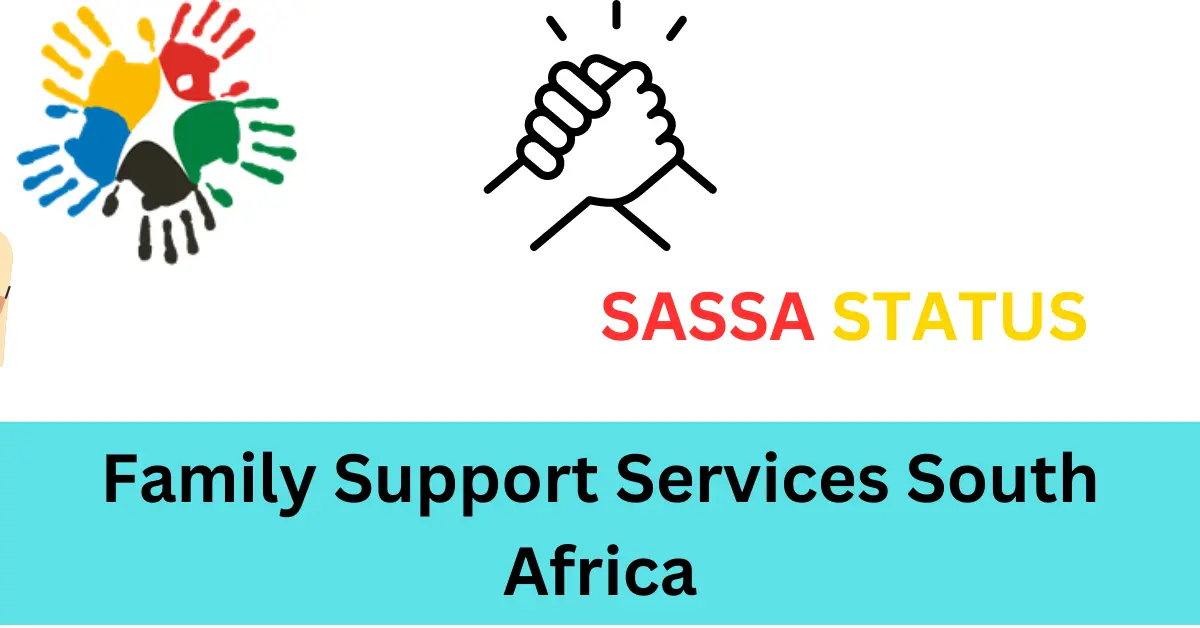Family Support: Many people find that family is a blessing, but when the challenge of supporting a poor family arises it becomes difficult.
South Africa’s family support service plays a crucial role in providing families facing diverse problems with essential resources. These services provide guidance, support, and counseling to families in order to improve the overall health of their family unit.

These services can be vital in cultivating resilience and stability amongst communities, especially when social and economical factors are a major factor. South Africa prioritizes the family support in order to better combat problems such as child welfare, domestic violence and poverty.
Also Read: Supporting Vulnerable Peoples in South Africa
South Africa Types Of Family Support Services By 2024
Families in need can benefit from a number of important family support services. These services are essential in helping to combat poverty, promote child welfare and support vulnerable members. Some types of services that provide support to families include:
SASSA Grant for Child Support: This grant is provided monthly by the South African Social Security Agency, SASSA to caretakers of children below the age of 18. This grant has been designed to improve children’s well-being and alleviate the effects of poverty.
Foster Child Grant Foster Child Grants are available for parents who care for foster children. This grant covers the costs of providing foster children with care, and helps foster parents maintain stable foster care arrangements.
Age Pension: Age pension is an allowance for people over 60 who have no employment. This grant gives financial aid to elderly people who don’t have any other means of support or income.
Relief of Distress:Social Relief of Distress provides temporary aid to families and individuals who face a crisis, emergency or disaster situation. This aid is meant to provide families with the basics they need during hard times.
Family Counseling Services: Various organizations and NGOs offer family counseling services to address issues such as domestic violence, marital conflicts, parenting challenges, and emotional distress. These services aim to strengthen family relationships and promote healthier family dynamics.
Parenting Workshops and Support Groups: Parenting workshops and support groups provide parents and caregivers with valuable information, skills, and emotional support to enhance their parenting abilities. These programs often focus on topics like child development, discipline strategies, and effective communication within families.
Early Childhood Development (ECD) Programs: ECD programs offer support and resources for young children’s development, including preschool education, nutritional support, and health services. These programs play a critical role in preparing children for school and improving their long-term outcomes.
Substance Abuse Rehabilitation Services: Families affected by substance abuse can access rehabilitation and counseling services aimed at supporting recovery and improving family functioning. These services address the impact of substance abuse on individuals and their families.
Challenges Faced by Families in South Africa
Families in South Africa face a range of significant challenges that impact their well-being and stability. These challenges are often interconnected and influenced by socioeconomic factors, historical legacies, and ongoing social issues. Here are some key challenges faced by families in South Africa:
- Poverty: Poverty remains a pervasive challenge for many families in South Africa. High levels of unemployment, income inequality, and limited access to basic services contribute to families struggling to meet their daily needs. Poverty not only affects material well-being but also impacts education, health, and overall quality of life for family members.
- Unemployment: South Africa has high rates of unemployment, particularly among youth and in certain regions. The lack of employment opportunities leads to financial strain within families, affecting their ability to provide for essential needs and leading to feelings of hopelessness and stress.
- HIV/AIDS Epidemic: South Africa has one of the highest HIV/AIDS prevalence rates globally. The epidemic has profound effects on families, including loss of breadwinners, increased caregiving responsibilities, and stigma associated with the disease. Families affected by HIV/AIDS often face challenges accessing healthcare and support services.
- Domestic Violence and Gender-Based Violence: Gender-based violence, including domestic violence and intimate partner violence, is prevalent in South Africa. This violence has devastating effects on families, causing physical and psychological harm to victims and disrupting family dynamics. Children growing up in violent households may experience trauma and exhibit behavioral problems.
- Inadequate Housing and Infrastructure: A significant number of households in South Africa grapple with substandard living conditions, including residing in informal settlements that lack sufficient access to fundamental amenities such as clean water sources, proper sanitation facilities, and reliable electricity supply. Poor housing conditions contribute to health problems and exacerbate socio-economic inequalities.
- Education Inequality: Educational opportunities are not equally accessible to all children in South Africa. Factors such as poor-quality schools, lack of resources, and barriers to education contribute to educational inequality. This inequality perpetuates the cycle of poverty and limits future opportunities for children from disadvantaged families.
- Substance Abuse: Substance abuse, including alcohol and drug addiction, is a significant issue affecting families in South Africa. Substance abuse can lead to family breakdown, neglect of children, financial strain, and increased risk of violence within households.
- Cultural and Traditional Practices: Certain cultural practices and beliefs may pose challenges for families, especially regarding issues like gender roles, marriage customs, and family responsibilities. Balancing traditional values with modern societal demands can create tensions within families.
How the South African Social Security Agency (SASSA) is Reshaping Society?
The South African Social Security Agency (SASSA) plays a critical role in reshaping society by addressing socio-economic challenges and promoting social welfare through its various programs and initiatives. Here’s how SASSA is contributing to reshaping society in South Africa:
- Alleviating Poverty: SASSA’s social grant programs, such as the Child Support Grant, Old Age Pension, and Disability Grant, provide essential financial assistance to vulnerable individuals and families living in poverty. By reducing financial strain and improving access to basic needs, SASSA helps lift families out of poverty and reduces inequality within society.
- Promoting Social Inclusion: SASSA’s grants ensure that marginalized groups, such as children, the elderly, and persons with disabilities, are included and supported within society. This promotes social cohesion and strengthens the social fabric by ensuring that all members of society have access to essential resources and opportunities.
- Supporting Child Welfare and Development: The Child Support Grant offered by SASSA plays a pivotal role in supporting children’s well-being and development. By providing financial assistance to caregivers, SASSA enables children from disadvantaged backgrounds to access education, healthcare, and nutrition, thus breaking the cycle of intergenerational poverty.
- Empowering Vulnerable Populations: SASSA’s grants empower vulnerable populations, including women, elderly individuals, and persons with disabilities, by giving them financial independence and autonomy. This empowerment fosters dignity and self-respect among beneficiaries, enabling them to participate more actively in society.
- Improving Health Outcomes: Access to SASSA grants contributes to better health outcomes for beneficiaries. With improved financial stability, families can afford healthcare services and medications, leading to better overall health and well-being within communities.
